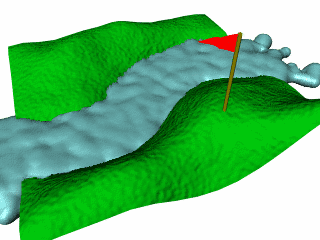Curve flow
The Curve Flow effect emits particles that flow along a curve you create. You can use this effect to create flowing fluids, gases, or instanced objects. The emitted particles start at the first CV and end at the last CV you drew when you created the curve.
For example, to make water flow down a ravine, you would first create a NURBS or polygonal surface as the hill with a ravine. You then create a curve in the middle of the ravine from beginning to end. You use the Curve Flow effect on the curve and adjust the Curve Flow attributes. Finally, you select an appropriate render type such as Blobby Surface for the emitted particles and adjust their appearance.

It’s often useful to use the Curve Flow effect on the same curve more than once. By setting option settings differently with each usage, you can create a complex look not possible with a single usage.
To keep particles flowing within a planar boundary, for instance, water flowing down a river, you can sandwich the curve between invisible planes and then make the particles collide with the planes. The particles bounce within the two invisible planes.
See Create curve flow.
Surface flow
The Surface Flow effect emits particles that flow along the surface of any NURBS model. You can use this effect to create flowing fluids, gases, or instanced objects. The flow effect automatically adjusts to any changes in the shape of the surface.